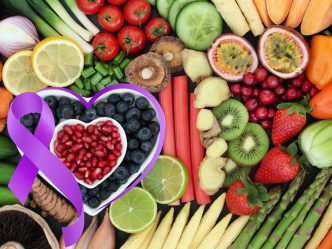If you’ve ever made an impulse trip to the store for a sweet or salty snack, you know just how powerful food cravings can be. Luckily, curbing your hankerings for high-calorie fare is easier than you think. Those cravings may actually be your body telling you something and by simply tuning in, you can overcome those mini bursts of hunger.
“Powerful food cravings seem to appear late afternoon or late at night and, believe it or not, may be your body’s way of letting your know you could be dehydrated, requiring some movement, or just plain tired”, says Katelyn Metz, a registered dietician at Augusta University Health. Cravings can allow you to take more mindful approach to your dietary habits; are you actually even hungry? Or do you happen to be bored, stressed, or watching late-night TV with all the commercials for junk foods?
Try these sure-fire strategies for keeping cravings at bay and you’ll be surprised at how easy it is to stay on track with a healthy diet.
1. Substitute snacks
It’s easy to be tempted by unhealthy snacks when they’re sitting in plain sight. The solution: Switch out sugary treats and carb-laden foods with healthier options. “Are you familiar with the term “out of sight, out of mind”? This can be applied to food choices as well; we’re more likely to want the things that we see in front of us. Knowing this, make the conscious decision to place fruits, vegetables, whole grains, and fiber-rich foods in your line of sight, rather than high-calorie, high-fat junk foods. Keep the junk foods in pantries or cabinets – or better yet – just leave them at the store,” says Metz.
2. Drink water
To ward off food cravings, boost your water intake. “Hunger, thirst, sleep cues are all intertwined. That “I’m hungry” signal is often actually an “I’m thirsty” signal; start each meal with a glass of water to prevent overeating. Remember, you may just be thirsty! Don’t forget to hydrate during the day too, aiming for eight to twelve 8-ounce glasses of water daily,” says Metz.
3. Rest up
If you find yourself pining for a caffeinated soda or a bag of chips late in the afternoon, it could be your body telling you to get some much-needed Z’s. In fact, research performed by the Mayo Clinic showed that people who skimped on a little over an hour of sleep downed 550 more calories the next day. “When the brain is tired, it craves sugar and caffeine, near instant energy sources! But remember, with tired and hunger cues interlaced, it’s unlikely a sweet treat or caffeinated beverage is going to leave you fully refreshed. Being aware of these feelings should lead you to examine your sleep habit,” says Metz. Metz recommends asking yourself if you are getting 7.5-8 hours of good, quality sleep and if you are practicing good sleep hygiene.
4. Retrain your brain
You can easily teach your brain to crave healthier snacks simply by making them more visible. “Allow your snack choice to be an easy decision when you have a craving by having healthy snacks on hand and in sight. Studies have shown that people who live in households with a fruit bowl on the countertop, rather than breakfast cereal, tend to have a lower body weight,” Metz says. “Additionally, pay attention to those cravings, we call this mindfulness. Perhaps you’re bored or stressed and thus, the pantry is calling your name. Rather, find a different activity to shift your focus from food; go for a walk, call a friend, play with your child, or walk your dog, the list goes on and on!”
5. Treat yourself occasionally
Believe it or not, it’s okay to succumb to your cravings once in a while. Entirely omitting the foods we love can put us at risk for binging on them when given the chance. Be sure to set out a small portion rather than eating from a bag or carton to avoid eating too much of a good thing. “For this reason, purchasing your favorite snacks in snack-size rather than family-size portions can be a smart strategy. This can allow you to enjoy your favorite foods with less likelihood of losing control of your portions,” says Metz.





